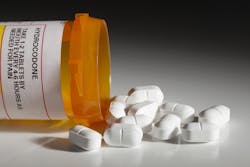The Centers for Disease Control and Prevention (CDC) has pledged another $301 million toward its Overdose Data to Action initative aimed at lowering opioid abuse.
Overdose Data to Action is a 3-year cooperative agreement that began in September 2019. It focuses on the complex and changing nature of the drug overdose epidemic and highlights the need for an interdisciplinary, comprehensive and cohesive public health approach, according to the agency's website.
“Thanks to President Trump’s leadership and the hard work of so many Americans in local communities, we are beginning to win the battle against the opioid overdose crisis,” said Alex Azar, Department of Health and Human Services (HHS). “Our country is seeing the first drop in overdose deaths in more than two decades, more Americans are getting treatment for addiction and lives are being saved. At the same time, we are still far from declaring victory. We will continue executing on the Department’s 5-Point strategy for combating the opioid crisis, and laying the foundation for a healthcare system where every American can access the mental healthcare they need.”
The funds, which will support the work of 47 states, Washington D.C, two territories, and 16 counties and cities, are part of the HHS’ five-point strategy to help combat the opioid overdose epidemic resulting from America’s drug crisis. The CDC and HHS efforts are part of an all-of-government effort to end America’s complex and evolving overdose epidemic.
Over three years, recipients will gather and rapidly report data that includes the substances, circumstances, and locations leading to overdoses and deaths, as well as demographic data such as age, race, and gender.
Funded programs will yield information crucial to a better understanding of why, and among whom, overdoses and deaths are taking place. CDC and HHS will rapidly use that information to enhance prevention and response efforts across the country.
In addition, recipients of these new funds will work to strengthen prescription drug monitoring programs, improve state-local integration, establish links to care, and better support health care providers and health systems.
“Strengthening our nation’s public health infrastructure is essential to capturing the predictive data needed to prevent drug overdose deaths and their devastating effects on families,” said Robert R. Redfield, M.D. “We are committed to supporting our partners and communities, ensuring they have the tools needed to bring the opioid and drug use disorder epidemic to an end in America.”
CDC supports prevention of drug and opioid specific overdose by:
- Using data to monitor emerging trends and direct prevention activities.
- Strengthening state and local capacity to respond to the epidemic.
- Working with providers, health systems, and payers to reduce unsafe exposure to opioids and treat addiction.
- Coordinating with public safety and community-based partners to rapidly identify overdose threats, reverse overdoses, link people to effective treatment, and reduce harms associated with illicit opioids.
- Increasing public awareness about the risks of opioids.
To learn more about Overdose Data to Action: https://www.cdc.gov/drugoverdose/od2a/index.html
About the Author
EHS Today Staff
EHS Today's editorial staff includes:
Dave Blanchard, Editor-in-Chief: During his career Dave has led the editorial management of many of Endeavor Business Media's best-known brands, including IndustryWeek, EHS Today, Material Handling & Logistics, Logistics Today, Supply Chain Technology News, and Business Finance. In addition, he serves as senior content director of the annual Safety Leadership Conference. With over 30 years of B2B media experience, Dave literally wrote the book on supply chain management, Supply Chain Management Best Practices (John Wiley & Sons, 2021), which has been translated into several languages and is currently in its third edition. He is a frequent speaker and moderator at major trade shows and conferences, and has won numerous awards for writing and editing. He is a voting member of the jury of the Logistics Hall of Fame, and is a graduate of Northern Illinois University.
Adrienne Selko, Senior Editor: In addition to her roles with EHS Today and the Safety Leadership Conference, Adrienne is also a senior editor at IndustryWeek and has written about many topics, with her current focus on workforce development strategies. She is also a senior editor at Material Handling & Logistics. Previously she was in corporate communications at a medical manufacturing company as well as a large regional bank. She is the author of Do I Have to Wear Garlic Around My Neck?, which made the Cleveland Plain Dealer's best sellers list.
Nicole Stempak, Managing Editor: Nicole Stempak is managing editor of EHS Today and conference content manager of the Safety Leadership Conference.
